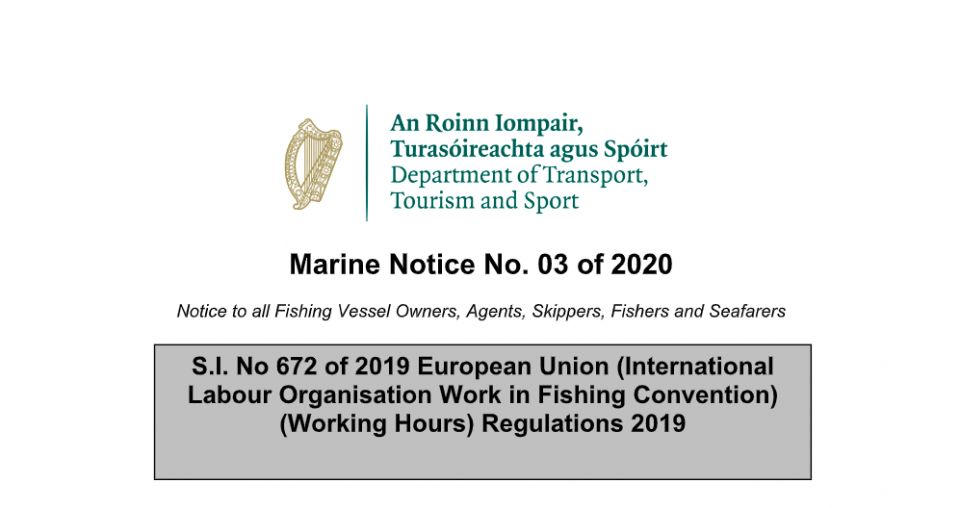- Background
The Work in Fishing Convention, 2007 (C188) was adopted at the 96th session of the International Labour Conference in June 2007. It aims to ensure decent conditions of work in the fishing sector with regard to minimum requirements for work on board fishing vessels; conditions of service; accommodation and food; medical care and health protection; and social security. The Convention entered into force on 16 November 2017 and, so far, 14 Member States of the ILO have ratified it.
On 31 January 2017, Council Directive (EU) 2017/159 was published in the Official Journal of the European Union (OJ No. L 25, 31.1.2017, p.12). This Directive contains a Social Partners’ Agreement, concluded on 21 May 2012, which aims to implement the Work in Fishing Convention.
The European Union (International Labour Organisation Work in Fishing Convention) (Working Hours) Regulations 2019, (S.I. No 672 of 2019) was signed into law on 19 December 2019 and gives effect to the provisions of Article 11 of the Annex to Council Directive 2017/159/EU.
- Objective of the Regulations
The objective of the Regulations is to give effect to provisions of Article 11 of the Annex to Council Directive 2017/159/EU which relate to Hours of Work and Rest. They prescribe maximum hours of work and minimum hours of rest for workers on board sea-going fishing vessels, require records to be kept of their hours of work or rest and provide for enforcement measures.
- Application
The Regulations apply to sea fishing vessels which are registered in the State.
The European Communities (Workers on Board Sea-Going Fishing Vessels) (Organisation of Working Time) Regulations 2003 (S.I. No. 709 of 2003) no longer applies to those workers to which the European Union (International Labour Organisation Work in Fishing Convention) (Working Hours) Regulations 2019, (S.I. No 672 of 2019) apply.
- Competent Authority
The Marine Survey Office is designated as the competent authority in the State for the purposes of the Regulations.
- Hours of Work and Rest
Article 11 of the Annex to Council Directive (EU) 2017/159 set specific limits on fishers’ hours of work and rest, which are as follows:
Subject to the limit of an average of 48 hours of work a week over a reference period not exceeding 12 months, the limits on hours of work and rest in respect of a worker on board a sea-going fishing vessel are as follows:
- maximum hours of work shall not exceed 14 hours in any 24-hour period, and 72 hours in any seven-day period; or
- minimum hours of rest shall not be less than 10 hours in any 24-hour period, and 77 hours in any seven-day period
- Record Keeping
The master, or a person authorised by the master, shall maintain on board the fishing vessel a record of the daily hours of work or rest for every fisherman on board the vessel. Each record shall be completed monthly in arrears and shall be endorsed by the master (or a person authorised by the master), and by the relevant fisherman no later than 7 days after the last day of the calendar month to which the record relates. The relevant fisherman should be given a copy of the endorsed record. Each record should be retained for at least one year from the date of its making.
Please refer to Appendix 1 for a sample form which can be used to provide evidence of compliance with these Regulations.
- Enforcement
In order to ensure compliance with these Regulations, a surveyor of ships, may do any of the following:
- at all reasonable times board any fishing vessel while the vessel is in the State;
- search and inspect the fishing vessel and any documents or records found on board;
- require any person on board the fishing vessel to produce any report, document or record the surveyor of ships may reasonably require for the purposes of his or her functions under these Regulations;
- inspect, examine and take copies or extracts from or take away, any report, document or record that the surveyor of ships finds in the course of his or her inspection and require the relevant person to certify the copy as a true copy;
- detain a vessel that fails to comply with the provisions of hours of work or hours of rest in these Regulations and where detention is deemed necessary for the protection of the health and safety of the fishermen on board.
Notice of detention
Where a fishing vessel has been detained, the Marine Survey Office, in its role as competent authority shall serve a notice of detention on the owner or the master. The notice of detention shall amongst other things, state the grounds upon which the fishing vessel is being detained and specify the action to be taken before the notice will be withdrawn.
An owner or master on whom a notice of detention has been served who is of the opinion that the notice of detention has been complied with shall inform the competent authority in writing. Where appropriate, the competent authority may withdraw the notice of detention.
Direction
Where the competent authority considers that an owner or master is failing to comply with these Regulations, the competent authority may serve a direction on that person.
A direction may amongst other things, state the grounds upon which the direction is made and specify the action to be taken by the person on whom the direction is served and where appropriate, the period within which that action shall be taken.
A direction shall be complied with within such period as may be specified in the direction.
Marine Notices are issued purely for maritime safety and navigation reasons and should not be construed as conferring rights or granting permissions.


Recent Comments